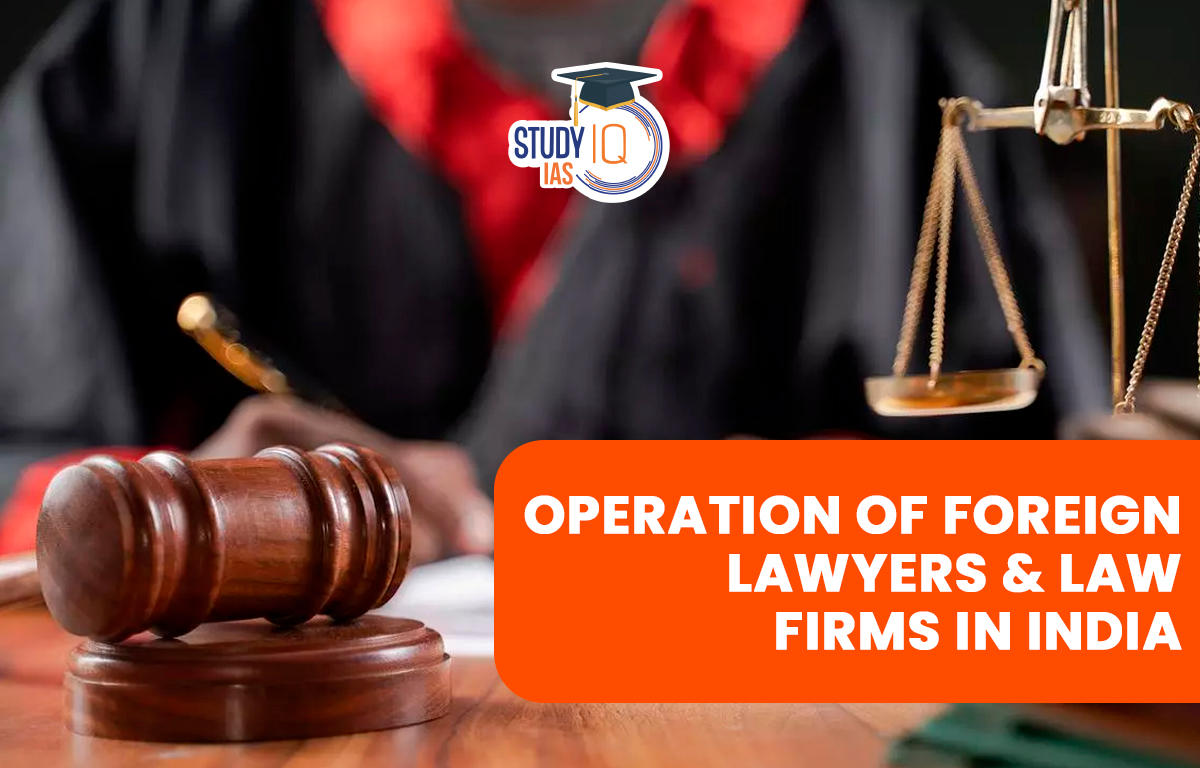Table of Contents
Context: The Bar Council of India (BCI) has notified the Bar Council of India Rules for Registration and Regulation of Foreign Lawyers and Foreign Law Firms in India, 2022.
Key Highlights
The Bar Council of India Rules for Registration and Regulation of Foreign Lawyers and Foreign Law Firms in India, 2022’:
- The new rules will enable foreign lawyers and law firms “to practice foreign law, diverse international law and international arbitration matters in India on the principle of reciprocity in a well-defined, regulated and controlled manner”.
- Registration with BCI: The rules allow foreign lawyers and law firms to register with BCI to practice in India if they are entitled to practice law in their home countries.
- Fly in and fly out basis: The requirement of registration with the BCI would not apply to law practice by a foreign lawyer or foreign law firm on a ‘fly in and fly out basis’ for the purpose of giving legal advice to a client in India.
- However, in such a case, the lawyer or firm cannot have an office in India, and their practice cannot exceed 60 days in any 12-month period.
- A primary qualification required from them is a certificate from the competent authority of their country that they are entitled to practice law in that country.
- Limitations and restrictions:
- However, the foreign lawyers and law firms cannot practice Indian law.
- The foreign lawyers or foreign Law Firms shall not be permitted to appear before any courts, tribunals or other statutory or regulatory authorities.
- Indian lawyers working with foreign law firms will also be subject to the same restriction of engaging only in “non-litigious practice.”
- Significance of the move:
- Benefit to Indian lawyers: The BCI said that the move would benefit Indian lawyers, whose standards of proficiency in law are comparable to the international standards.
- FDI Concerns: The BCI said that the rules would also help to address the concerns expressed about the flow of Foreign Direct Investment into the country.
- India as hub for international commercial arbitration: By allowing the operation of foreign lawyers and law firms in India, the rules would help make India a hub for international commercial arbitration.
- Increased competition and expertise: Foreign law firms and lawyers may bring in specialized expertise and international best practices, which can improve the overall quality of legal services in India.
What does the current law say about Foreign Lawyers and Law Firms?
- According to the Advocates Act of India, 1961, the advocates enrolled with the BCI “alone” can “practice law” in India.
- For this, they must obtain a license to practice as a lawyer from the BCI. However, they can only do so if their country allows Indian lawyers to practice legal professions there.
- In 2018, BCI told the Supreme Court that it was not in favour of allowing foreign law firms to open branch offices in India.
- The Supreme Court also passed a verdict stating that foreign lawyers and firms are not allowed to practice law in India unless they meet the requirements.
- The latest notification by BCI is a U-turn from its 2018 stance.
About the Bar Council of India (BCI)
- The BCI is a statutory body established under the Advocates Act, 1961, and it regulates legal practice and legal education in India.
- Concerned Ministry: The Ministry of Law and Justice.
- Functions of BCI:
- It performs the regulatory function by prescribing standards of professional conduct and etiquette and by exercising disciplinary jurisdiction over the bar.
- It also sets standards for legal education and grants recognition to Universities whose degree in law will serve as qualification for enrolment as an advocate.
- In addition, it performs certain representative functions by protecting the rights, privileges and interests of advocates and through the creation of funds for providing financial assistance to organize welfare schemes for them.
- Composition of BCI:
- The Bar Council of India consists of members elected from each State Bar Council, and the Attorney General of India and the Solicitor General of India who are ex-officio members.
- The members from the State Bar Councils are elected for a period of five years.
- The Council elects its own Chairman and Vice-Chairman for a period of two years from amongst its members.





















 WhatsApp
WhatsApp